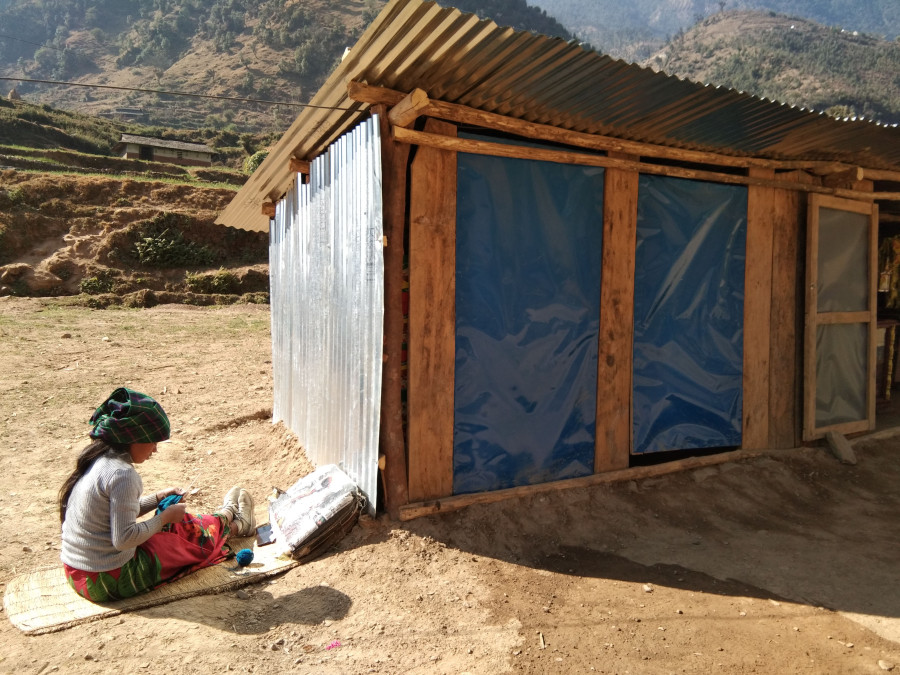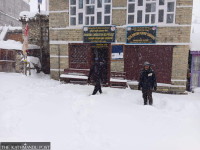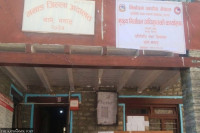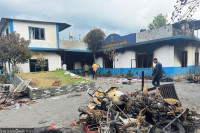Gandaki Province
Flood, landslide-displaced Baglung villagers still wait for new houses
The displaced families say government authorities and the people’s representatives are indifferent towards their problems, months after they were forced to abandon their homes.
Prakash Baral
Thirteen-year-old Madan BK of Dhorpatan Municipality-9 lost all his family members in the devastating floods and landslides of Bhujikhola in September 2020. Since then, he has been staying with his distant relative, Bhim Bahadur BK.
Madan, a seventh grader at a local community school, is unsure if he will be able to continue his studies given his poor financial condition.
“I am taking shelter at my relative’s house. I don’t have any money to pay for my education nor to rebuild my house,” he said.
Madan’s 15-year-old cousin, Sushmita, also lost her family in the September disaster. She too has been staying with Bhim Bahadur.
After the calamity struck, various individuals and organisations had announced their support to the BK cousins. All tiers of the government had announced relief packages and housing reconstruction aid for them. But it’s been five months since the disaster and they are yet to receive any support, says Bhim Bahadur.
“The children work as daily wage earners to manage funds for their education,” he said. “We don’t have much choice.”
The flooded Bhujikhola had swept away 126 houses downstream in Wards 8 and 9 of Dhorpatan Municipality on September 2. As many as 22 people were killed in the flood while 15 others are still unaccounted for. The settlements on the banks of the stream were most affected by the disaster.
High-level government officials had reached the flood-and landslide-hit area and announced relief packages for the victims. Home Minister Ram Bahadur Thapa had announced that the federal government would provide at least Rs 300,000 to each family displaced by the floods and landslides to reconstruct their houses. The Gandaki provincial government had also declared support of Rs 100,000 per family and Dhorpatan Municipality had pledged to provide additional amounts for the reconstruction of private housing.
None of the packages has reached the victims.
September’s flood had also swept away the house of Hum Bahadur BK of Dhorpatan-9, killing both his wife and sister. Hum Bahadur, with his two sons, has been living in a flimsy hut made out of foliage and tree branches.
“We are shivering in the shack during the cold winter. Many came and pledged support but they did not help us,” said Hum Bahadur. “We were provided food for a few weeks after the incident but now I have nothing to eat. I work as a daily wage earner and it is becoming very difficult to survive on my meagre earnings.”
The displaced people say the government authorities and the people’s representatives are indifferent towards their problems.
Some people’s representatives admit to the local units’ inefficiency in working effectively to provide relief and rehabilitate victims.
“The municipality does not have enough budget to reconstruct houses for all affected people. We have to depend on the federal government’s assistance for the reconstruction drive,” said Dev Kumar Nepali, mayor of Dhorpatan Municipality
The floods and landslides of September also destroyed two schools, a health post, four micro-hydro projects and several drinking water and irrigation projects in the municipality and damaged a 10 kilometre-long road section. The reconstruction of these infrastructures is yet to gather momentum.
Nabachetana Basic School in Dhorpatan Municipality Ward No. 9, which was destroyed in the disaster, has collected Rs 3 million from donors, mostly local youths employed in foreign countries, to initiate the reconstruction of the school building.
“We started running classes by building temporary huts. We requested the people’s representatives and leaders of various political parties to help reconstruct the school building. But no one came forward,” said Ram Bahadur Gharti, the school principal. “We have begun the reconstruction of the school building with the donation amount.”
Several more settlements in the Bhujikhola area are still at risk of floods and landslides, according to senior soil conservation officer Sher Bahadur KC.
“Houses should not be constructed up to 100 metres on both sides of the Bhujikhola,” he said.
Many families at Lakuribot, Ulleri and Nabi, among other settlements at ward 9, that were displaced by the September flood have repaired their houses and moved back in without consulting with technicians. “Most people didn’t have a choice but to do minor repairs and move into damaged houses, as they had nowhere else to go,” said Hari Bahadur Gharti, the chairman of Ward No 9. “It is still not clear who will initiate the reconstruction work and when.”
Chief District Officer Suresh Neupane says efforts are underway to coordinate with the federal government for the reconstruction of private housing and other infrastructure in the flood-and-landslide-affected areas.




 13.12°C Kathmandu
13.12°C Kathmandu.jpg)











